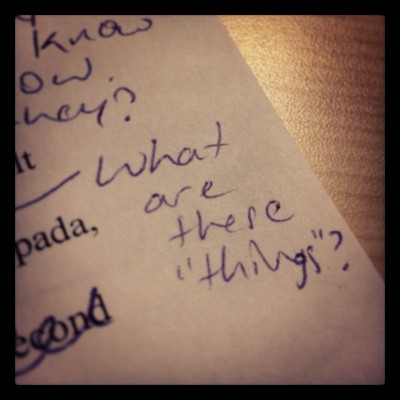What Are These Things?: How to Make Your Writing Better
“But I’m just not good at writing.” It’s a lament I hear on almost a daily basis, as students come to me looking for an easy way to fix their work. Believe it or not, in most cases, writing is easy to fix. Of course, there are exceptions, but when writing reads awkwardly or doesn’t make sense, it is either 1) not well thought out or 2) thrown together without consideration of what has actually been put on the paper. I’ve posted before about thinking and how it relates to writing. If you’re struggling with what to say, you may want to head over there. But if you know what you want to say and no one understands you, or their eyes fix while reading your work, persevere here.
Right out of graduate school, I taught Writing and Composition at UNC Charlotte. I had a mantra for my students, “Be precise, and be concise.” If you can pull this off, you can be confident that your writing is “better”. But easier said than done, as the old adage goes.
Let’s start with “concise”, mainly because I have less to say about it. And that is the point entirely. Don’t use more words than needed to communicate your thoughts. Condense, cut, and show no mercy to your work. Use as few words as possible.

Be “precise”. This one is harder because you already know what you are trying to say, but you’re trying to communicate it to an entirely different person, who has a unique way of looking at the world and may be clueless as to what is informing your thoughts and ideas. People get into serious trouble in this arena when they begin to write exactly the way they talk. A conversation always includes a context, and that context helps inform its participants. Like an inside joke, context allows the speaker to leave out details without adversely effecting meaning. But in writing, we rarely have that luxury, especially if your audience encompasses any sort of range.
So how can you become more precise? Of course you can increase your vocabulary. (Always do this. It’s very important no matter how long you’ve been out of school.) But most importantly, pay attention to your pronouns. He, she, it – while extremely valuable – can wreck havoc on your writing if used flippantly. Remember that pronouns take the place of nouns, and they tend to refer to a noun close to them. If you are considering two items, it will refer to the last item you named. Remember that.
I have a pet peeve in writing – use of the word “things”. Thing or things means nothing. A thing is an object, which is not named. So the only characteristic communicated by the word is the notion of its existence. That doesn’t really tell me a whole lot. Rarely is use of this word a good idea. The comment I write most frequently on papers, letters, resumes, and any other form of written communication is, “What are these things?”
Say what you mean. If it’s not worth stating, it’s not worth implying, and you certainly don’t want folks inferring. Chances are, they’re going to infer something you really didn’t mean…or their eyes will simply glaze over.
Leave a Reply